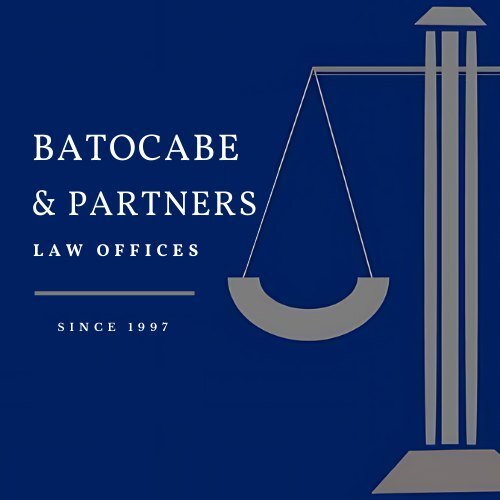Best Lawyers in Pasig
Share your needs with us, get contacted by law firms.
Free. Takes 2 min.
List of the best lawyers in Pasig, Philippines
Philippines Legal Questions answered by Lawyers
Browse our 263 legal questions in Philippines and read the lawyer answers, or ask your own questions for free.
- Separated but not legally - financial status
- My husband and I have been separated (not legally) since October 2025. The separation is not formal, as I chose to leave our home due to the verbal and emotional abuse I experienced daily. My husband has not worked for the past eight years, and I have been the sole... Read more →
-
Lawyer answer by Recososa Law Firm
Hello: Thank you for sharing your situation. I understand how emotionally exhausting this must be for you. I am the owner of Recososa Law Firm, and we are located in the Philippines, with offices in Luzon, Visayas, and Mindanao. Presuming...
Read full answer - Spouse separated in fact - financial status disclosure
- My husband and I have been separated (not legally) since October 2025. The separation is not formal, as I chose to leave our home due to the verbal and emotional abuse I experienced daily. My husband has not worked for the past eight years, and I have been the sole... Read more →
-
Lawyer answer by Recososa Law Firm
Hello: Thank you for sharing your situation. I understand how emotionally exhausting this must be for you. I am the owner of Recososa Law Firm, and we are located in the Philippines, with offices in Luzon, Visayas, and Mindanao. Presuming...
Read full answer - is the 200k annulment fee has to be paid i full?
- me and my ex has been separated for almost 16 years. i really want an annulment. we got married as soon as we turned 18. i didn't get any consent from my parents. and my ex doesn't have work up until now.
-
Lawyer answer by ERLAW
Atty. Roque here, an annulment lawyer from Roque Law Office. Based on what you shared, being separated for 16 years alone is not yet a ground for annulment under Philippine law. However, getting married at 18 without parental consent may...
Read full answer
Philippines Legal Articles
Browse our 18 legal articles in Philippines written by expert lawyers.
- Managing Labor Inspections for BPOs in the Philippines
- Managing Labor Inspections for BPO Companies in the Philippines The Department of Labor and Employment (DOLE) conducts unannounced inspections to verify compliance with General Labor Standards and Occupational Safety and Health standards. BPO companies must maintain meticulous payroll records covering the past three years to prove payment of night shift... Read more →
- Set Up a Foreign-Owned Corporation in the Philippines
- Setting Up a Foreign-Owned Domestic Corporation in the Philippines Key Takeaways Foreign investors can successfully incorporate and operate within the Philippine market by following highly structured national and local regulations. Successfully establishing your business requires understanding foreign ownership limits, meeting specific capital requirements, and navigating multiple government agencies. The Foreign... Read more →
- Guide to BSP Fintech Regulatory Compliance in the Philippines
- Fintech companies in the Philippines are primarily regulated by the Bangko Sentral ng Pilipinas (BSP) under the Manual of Regulations for Non-Bank Financial Institutions. Minimum capital requirements range from PHP 20 million to PHP 200 million, depending on the license type and business model. All fintech startups must register with... Read more →
About Hiring a Lawyer in Pasig, Philippines
Hiring a lawyer in Pasig, Philippines involves several steps. First, identify the nature of your legal issue to determine the type of lawyer you need. Lawyers often specialize in different areas such as family law, criminal law, corporate law, or real estate law. Once you have identified the type, research and compile a list of potential lawyers or law firms. You can find lawyers by searching online legal directories, asking for recommendations from friends or family, or contacting the Integrated Bar of the Philippines (IBP) for referrals. After narrowing down your choices, schedule consultations to discuss your case, understand their fees, and evaluate their expertise and approach. This helps you make an informed decision when hiring a lawyer who appropriately fits your legal needs.
Why You May Need a Lawyer
There are various circumstances in which individuals in Pasig may require legal assistance. Common situations include:
- Family Matters: This includes legal issues such as divorce, child custody, adoption, and spousal support.
- Property or Real Estate Disputes: Legal assistance might be needed in buying or selling property, settling disputes, or drafting leases.
- Criminal Charges: If you are accused of a crime, having a lawyer is crucial for defending your rights and navigating the legal system.
- Business Concerns: Lawyers can assist with business formation, contracts, mergers, and employment law compliance.
- Labor and Employment: Issues such as wrongful termination, discrimination, or wage disputes often require legal guidance.
- Personal Injury Claims: If you have been injured due to the negligence of others, a lawyer can help negotiate settlements or represent you in court.
Local Laws Overview
Pasig, being part of the National Capital Region of the Philippines, follows the national legal framework with some local ordinances that may affect residents. Key legal areas include:
- Civil Code: Covers personal and family relations, property, ownership, and obligations and contracts.
- Revised Penal Code: Governs criminal law and defines various offenses and their penalties.
- Labor Code: Provides the rules for employment, including employees’ rights, labor standards, and employer obligations.
- Local Government Code: Outlines the functions and responsibilities of local government units, including regulatory responsibilities like zoning and business permits.
Frequently Asked Questions
How do I know if a lawyer is licensed to practice in Pasig?
You can verify if a lawyer is licensed by checking with the Integrated Bar of the Philippines, which maintains a list of all lawyers in good standing.
What should I bring to my initial consultation with a lawyer?
Bring any relevant documentation related to your legal issue, such as contracts, court notices, or evidence. Also, prepare a list of questions for the lawyer.
How are lawyer fees typically structured in Pasig?
Lawyer fees can vary and may be structured as hourly rates, fixed fees, or contingency fees, depending on the type of legal service and agreement made.
What is the typical conduct of lawyers in court in Pasig?
Lawyers in Pasig, like elsewhere in the Philippines, are expected to adhere to professional conduct codes, including being punctual, respectful, and prepared for all court proceedings.
Can I represent myself in Pasig courts?
Yes, self-representation is allowed, but it is generally not recommended due to the complexity of legal proceedings and the potential for errors.
How long does a case typically take to resolve in Pasig?
The length of a case varies widely depending on its nature and complexity, with some cases resolving in months, while others may take years.
Are there free legal advice services available in Pasig?
Yes, certain governmental and non-governmental organizations offer free legal aid or advice to those who qualify, such as the Public Attorney's Office (PAO).
What languages do lawyers in Pasig typically speak?
Most lawyers in Pasig are proficient in English and Filipino, and some may speak local dialects.
What happens if I am not satisfied with my lawyer’s service?
If dissatisfied, you can discuss your concerns with the lawyer, seek mediation through the IBP, or file a formal complaint if there’s professional misconduct.
Are there specific legal services provided by the government in Pasig?
The government’s Public Attorney’s Office offers legal representation and services for qualified individuals unable to afford private counsel.
Additional Resources
For further assistance, you may consider contacting the following:
- Integrated Bar of the Philippines
- Department of Justice
- Public Attorney’s Office
- Local Barangay Offices for community-related legal advice
Next Steps
If you need legal assistance in Pasig, start by assessing your situation and determining the type of legal service required. Prepare the necessary documents and a list of questions for potential lawyers. Conduct research to find qualified legal professionals and arrange consultations. Once you select your lawyer, work closely with them to address your legal needs. Remember to communicate openly and honestly for the best legal outcomes.
Lawzana helps you find the best lawyers and law firms in Pasig through a curated and pre-screened list of qualified legal professionals. Our platform offers rankings and detailed profiles of attorneys and law firms, allowing you to compare based on practice areas, experience, and client feedback.
Each profile includes a description of the firm's areas of practice, client reviews, team members and partners, year of establishment, spoken languages, office locations, contact information, social media presence, and any published articles or resources. Most firms on our platform speak English and are experienced in both local and international legal matters.
Get a quote from top-rated law firms in Pasig, Philippines — quickly, securely, and without unnecessary hassle.
Disclaimer:
The information provided on this page is for general informational purposes only and does not constitute legal advice. While we strive to ensure the accuracy and relevance of the content, legal information may change over time, and interpretations of the law can vary. You should always consult with a qualified legal professional for advice specific to your situation.
We disclaim all liability for actions taken or not taken based on the content of this page. If you believe any information is incorrect or outdated, please contact us, and we will review and update it where appropriate.
Refine your search by selecting a practice area.



































